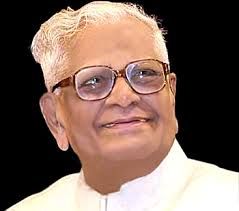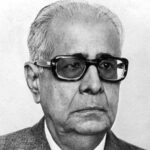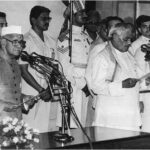R. Venkataraman: A Revered Leader and Visionary of India
R. Venkataraman, the 8th President of India, was a man of extraordinary vision and dedication. His contributions to the Indian political landscape and his role in shaping the country’s development make him a significant figure in the annals of Indian history. Born into a modest family, he rose to become one of India’s most respected leaders, with his legacy continuing to inspire generations.
In this article, we take a closer look at the life, achievements, and lasting impact of R. Venkataraman, examining his daily life, values, and the significance of his contributions to Indian society.
Early Life and Education
R. Venkataraman was born on December 4, 1910, in a small village near the town of Rajamadam in Tamil Nadu. His early years were marked by a thirst for knowledge, and he excelled academically, especially in his studies of history and literature. He completed his education in Madras (now Chennai) and went on to study law at the Government Law College, Madras.
Growing up in a family of modest means, Venkataraman was instilled with values of hard work, humility, and service to society. His family’s influence, coupled with his academic abilities, laid the foundation for his remarkable political and legal career.
Political Career and Contributions
Venkataraman’s political journey began with his association with the Indian National Congress. His commitment to the country’s independence and development led him to become an active participant in the political sphere. He was deeply influenced by the ideas of Mahatma Gandhi and Jawaharlal Nehru, and his political ideology was aligned with the principles of social justice, democracy, and secularism.
After India gained independence in 1947, Venkataraman served in various key governmental roles. He was elected to the Rajya Sabha in 1952 and later served as a member of the Union Cabinet under Prime Minister Indira Gandhi. Venkataraman held several important positions, including Minister of Finance and Minister of Defence, where he contributed to major reforms that shaped India’s economic and defense strategies.
His tenure as Minister of Defence was particularly notable for his efforts in modernizing India’s defense forces and enhancing national security. His work in these areas played a key role in strengthening India’s defense infrastructure, ensuring the country’s safety and sovereignty.
Presidency of India
In 1982, R. Venkataraman was elected as the 8th President of India, a position he held with great dignity and responsibility. His presidency was marked by a deep commitment to the values of the Indian Constitution, and he worked tirelessly to uphold the integrity of the office.
During his time as President, Venkataraman faced numerous political challenges, but he always remained neutral and focused on his duty as a guardian of the Constitution. His role in the Indian political system was one of stability and strength, guiding the nation through turbulent times with wisdom and diplomacy.
Venkataraman’s presidency was marked by his dedication to promoting social welfare, education, and rural development. He strongly believed that economic growth should go hand in hand with social progress, and he advocated for policies that would uplift marginalized sections of society.
Impact on Indian Society and Legacy
R. Venkataraman’s legacy extends far beyond his time in office. His contributions to Indian politics, governance, and society are monumental. He played a key role in shaping India’s defense policies, its economic growth, and the promotion of social welfare. His leadership in various capacities showed a deep understanding of the complexities of Indian society and the necessity of progressive change.
One of Venkataraman’s most notable contributions was his emphasis on the importance of education. He believed that education was the cornerstone of development and worked towards improving access to education for all, especially for underprivileged communities. His policies aimed to reduce inequality and promote a more inclusive society.
Venkataraman also advocated for the strengthening of India’s democratic institutions, ensuring that the country remained on a path of inclusive development. His leadership was instrumental in maintaining the delicate balance between power and responsibility, ensuring that India’s democracy remained robust and resilient.
Significance of R. Venkataraman’s Presidency
R. Venkataraman’s presidency stands as a beacon of dedication, neutrality, and wisdom. His term in office was a period of relative political stability for India. He successfully steered the country through a series of challenges, including political upheavals, economic reforms, and global changes.
His ability to maintain impartiality during times of political uncertainty earned him the respect of leaders from all political parties. Venkataraman’s presidency is remembered as a time when the values of the Indian Constitution were upheld, and the principles of democracy were preserved.
Personal Life and Philosophy
Despite his high-profile political career, R. Venkataraman lived a life marked by simplicity and humility. He was known for his honesty, integrity, and commitment to public service. His personal life reflected his deep respect for Indian traditions, culture, and values.
Venkataraman was also a family-oriented person who valued relationships and the importance of staying grounded. He was often seen spending time with his family and engaging in discussions on various matters concerning national and international politics.
FAQs about R. Venkataraman
Q1: What was R. Venkataraman’s major contribution to Indian defense?
As the Minister of Defence, R. Venkataraman played a significant role in modernizing India’s defense forces and improving the country’s national security strategy. His contributions to defense policy are still remembered as foundational to India’s defense preparedness.
Q2: How did R. Venkataraman impact the Indian economy?
As the Finance Minister, Venkataraman was instrumental in formulating policies that helped stabilize the Indian economy during critical times. His policies focused on industrialization, infrastructure development, and fiscal reforms.
Q3: What legacy did R. Venkataraman leave for future generations?
R. Venkataraman’s legacy is marked by his deep commitment to the Indian Constitution, social justice, and the values of democracy. His presidency and his time in public office significantly influenced India’s political, social, and economic landscape.
Conclusion
R. Venkataraman’s life and career embody the essence of selfless public service, commitment to the nation, and dedication to the values of democracy. His leadership, both as a politician and as President, has had a lasting impact on Indian society. Through his efforts, India has progressed in various fields, and his legacy continues to inspire the generations that follow.










